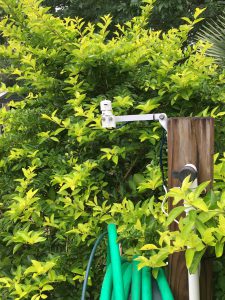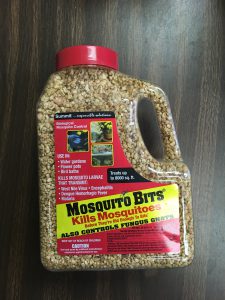Recent rains in the panhandle have kept many gardeners indoors. While we’re mostly watching the rain from inside, there are some lawn and landscape tasks to consider.
The most obvious is to turn off any automatic irrigation systems. Although rain shut-off devices are required for all automatic irrigation systems in Florida, many homeowners’ systems are not properly installed, are turned off, or are absent all together. Irrigating during times of adequate rainfall not only wastes a precious natural resource, but it can also be damaging to your turf and landscape plants by creating the perfect conditions for disease, especially fungi.

A rain shut-off device ensures that your irrigation system doesn’t come on during rainy weather. Photo by: Mark Tancig, UF/IFAS.
Something else to consider during all of this rain are potential mosquito breeding sites. Our most irritating mosquito species, those day-biting Asian tiger mosquitoes, love to breed in any small or large, water-holding containers around the house, including birdbaths, plant pot saucers, watering cans, five-gallon buckets, tarps, rain barrels, and the list goes on. The best method of control is to drain these containers every three to five days to prevent mosquito larvae from hatching. Another way to reduce larvae from hatching is to use a Bti product, which come in donut shaped dunks or as crumbles that can be sprinkled in the container. Bti controls mosquito, blackfly, and fungus gnat larvae, but does not harm beneficial insects and animals like birds, bees, butterflies, lizards, and frogs. If mosquitoes from the swamp or wetland behind your lot worry you, remember that those ecosystems have a diversity of insects that prey on mosquito larvae. Those containers in the yard do not have predators and can be a large source of the most aggravating mosquito species. For control of larger areas, including those natural ecosystems, contact your local mosquito control agency for assistance.

Bti bits are a way to prevent mosquito larvae from becoming biting adults. Photo by: Mark Tancig, UF/IFAS.
If you like to play in the rain a little, this is a good time to walk around and observe any runoff issues in the yard (make sure to do this only when it’s safe!). The ideal situation is to have runoff drain away from the house and percolate into landscaped areas. When surveying the yard in the rain, things to look for include areas of standing water (that could be a good location for a rain garden) and areas where erosion may be occurring (consider using berms or plantings to better direct and slow the water). Before doing any major drainage work, always check with your local building department. Some municipalities may require permits to ensure your improvements do not affect your neighbors or others downstream.

Rain gardens can turn a low, soggy spot into an aesthetic addition to your yard. Photo by: Courtney Schoen, TAPP.
If you have any questions about rain shut-off devices, mosquito control, or stormwater runoff, contact your local UF/IFAS Extension office for more information. Enjoy the rain; it will be sunny and hot before you know it!
- When to Worry About Your Citrus During Cold Weather - December 18, 2025
- A Tale of Two Hoses - November 13, 2025
- Anthracnose and Aster Yellowing Diseases Recently Diagnosed - August 28, 2025
